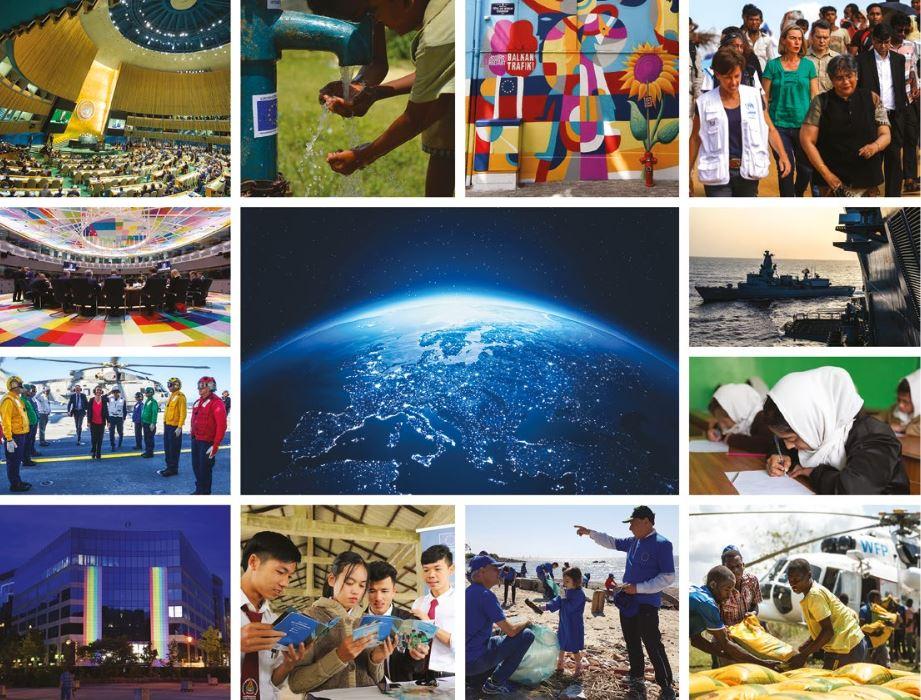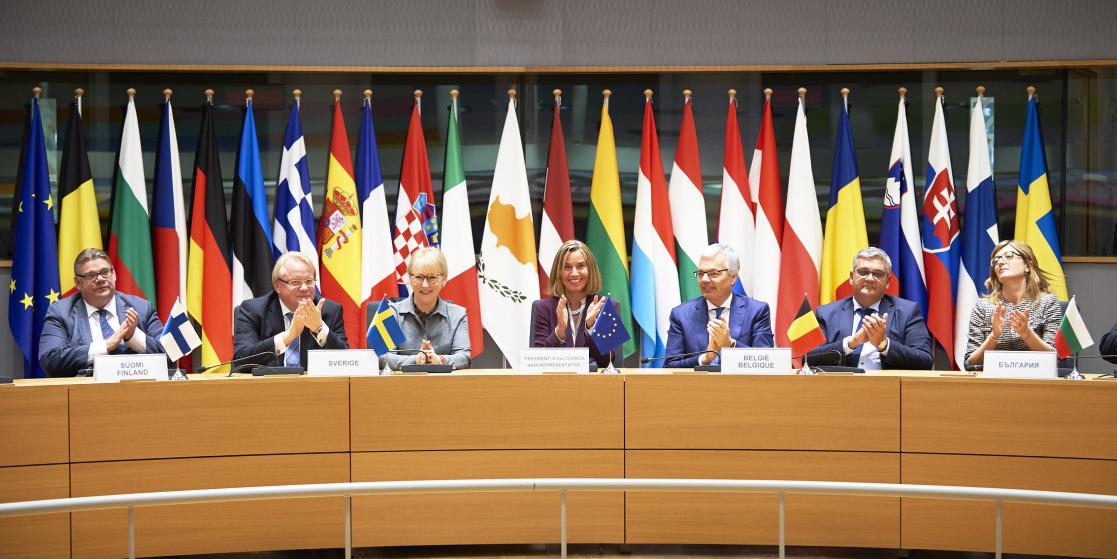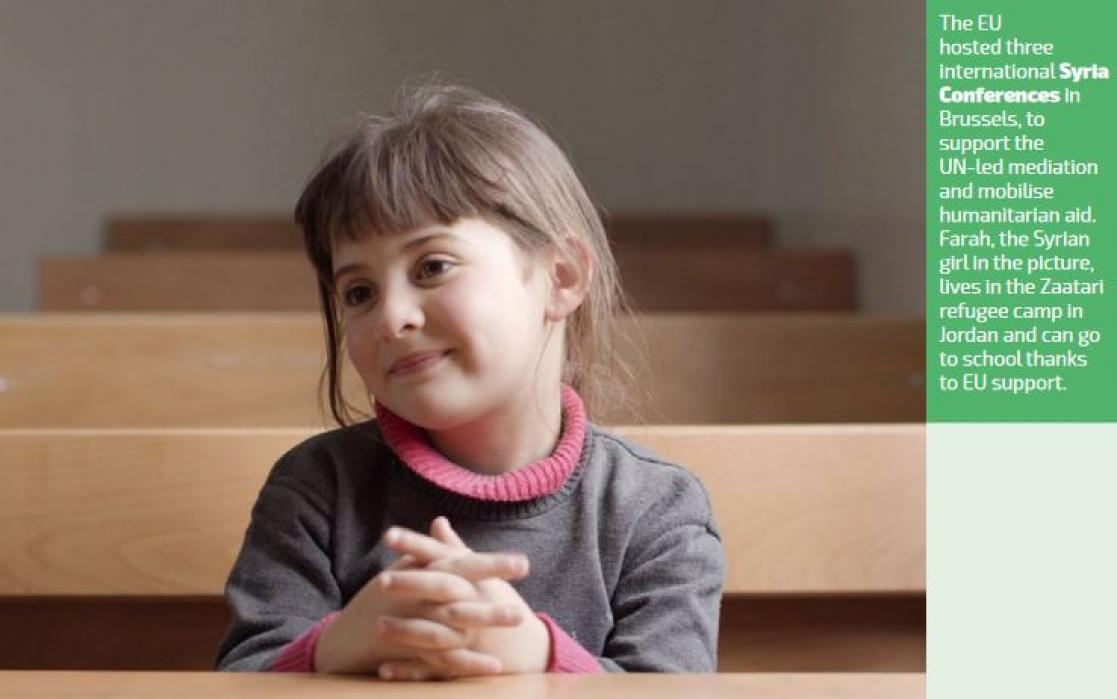The EU Global Strategy: A compass for our action in difficult times

The EU Global Strategy, under the title Shared Vision, Common Action: A Stronger Europe, has been elaborated in 2016 under the leadership of the High Representative. In those challenging times, both for Europe and globally, the strategy highlighted common ground, called for unity and presented a common way forward.
In three years, the European Union together with its Member States has achieved significant progress in turning this vision into reality and practical action, in Europe and around the world. This was achieved against the backdrop of increasingly polarised world politics, including the challenges to democratic systems and the rules-based global order.
“Today, the world is in no better shape than it was three years ago. But Europe is increasingly perceived as a global point of reference”, High Representative Federica Mogherini stressed in her foreword to the third progress report. “This report shows that we have fulfilled many of the promises of the Global Strategy, and that in some cases we have achieved even more than we were hoping for”.
On all 5 priorities, there has been steady progress reaffirming EU’s role of a credible global actor:
1. The Security of our Union
Implementation of the commitments made in the Global Strategy has in this area, maybe more than in others, exceeded expectations and confirmed Europe’s role of a security provider. The EU currently maintains 16 civilian and military missions and operations abroad deploying more than 4000 EU personnel. We have developed a new framework, tools and instrument to strengthen defence cooperation among Member States, most notable example of it being the Permanent Structured Cooperation (PESCO). PESCO enables 25 participating Member States to pursue cooperation amongst each other on concrete projects in defence and security. Cooperation with outside partners, such as the United Nations, NATO, the African Union or the OSCE, remains essential and has been strengthened over the years.

2. State and Societal Resilience to our East and South
The EU has expanded its support to fragile regions in its neighbourhood, helping build their resilience and capacity to resists potential disruptions and crises. Our work with the countries of the Eastern partnership has for example focused on rule of law, energy, cyber security, business development. In the Western Balkans, we have directly engaged in resilience building in areas of rule of law, connectivity, employment, helping reinvigorate the region’s EU perspective. We have helped the resilience of the MENA region by enhancing security and defence sectors and civil society development, among others. In Africa, we have promoted climate change mitigation and adaptation and sustainable management of natural resources.

3. An Integrated Approach to Conflicts
Inextricably linked to resilience is our integrated approach to solving conflicts and crises. It means the EU acts at all stages of the conflict cycle, acting promptly on prevention, responding responsibly and decisively to crises, investing in stabilisation, and avoiding premature disengagement if and when a new crisis erupts. Aiming to achieve sustainable solutions, we work through the multilateralism approach rooted in regional and international partnerships. Looking ahead, the 3rd progress report asks for more emphasis on conflict prevention and notes the growing importance of the systematic work on the climate-security nexus.

4. Global Governance for the 21st Century
The EU is committed to a global order based on international law, which ensures peace, security, human rights, and sustainable development. In the past years however, we have seen increasing challenges and risks to the global order and they require better global solutions. This is why we have stood up in the defence of the rules-based order, founded on international agreements, and supported multilateral cooperation. This has been the case with the UN agencies, some of our key partners, as well as with non-state actors and global and regional powers who we managed to convene around important issues (e.g. Iran, Syria, Venezuela, Libya, Afghanistan, etc).

5. Cooperative Regional Orders
The EU has continuously worked to be a credible and reliable partner, a ‘cooperative power’ by nature. And cooperative regional orders are considered essential for a functioning multilateralism. The best example of trilateral cooperation we have established last year, is a cooperation with the African Union and the UN, and notably on the issue of migration in Libya. In the past few years we have deepened our partnerships globally, through a new network of political and trade agreements and by our strengthening our bonds with regions, organisations and countries, and we will continue to support cooperative regional orders worldwide.

While delivering on these priorities, the approach of the EU Global Strategy was to make our work:
- Credible: Credibility is measured through consistency and the collective will and capacity to implement together agreed decisions. It also implies financial backing to our external action, and in order to sustain the EU’s global responsibility and ambition, an increase of 30 billion Euro for foreign policy and defence was proposed as part of the Multi-annual Financial Framework (MFF). The European Commission has also suggested to establish a single Neighbourhood, Development and International Cooperation Instrument (NDICI) within the next MFF.
- Responsive and visible: We have stepped up our strategic communications, investing in communication campaigns on numerous foreign policy priorities, in order to better present them to our citizens and our partners. In parallel, we have reinforced our work on countering disinformation and put in place concrete measures to tackle it in Europe and beyond; and
- Joined-up: We are effective when we speak and act united, across priorities and in every foreign policy action. Building on this premise, the EU Global Strategy helped promote more cooperation between our development, humanitarian and security sectors; insisted on the fact there is no hard line between internal and external dimensions of EU policies, and strived for greater coordination between Member States to achieve a more effective EU’s foreign policy.
“Everything we have achieved could prove short-lived if […] political will fades away in the future. Results need to be consolidated and new avenues that have been opened need to be explored further”, High Representative wrote, reminding that our choice of a stronger Europe would have ‘to be confirmed every day, at every step of the way’.
